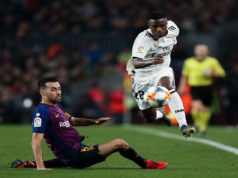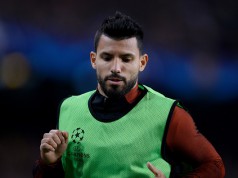The Ballon d’Or is broken.
Some may call Franck Ribery a sore loser for his recent comments that the award is too political and that he should have won over Cristiano Ronaldo, but he raised a valid point: Team accomplishments are not valued nearly as much as they should be.
“I have won everything with the team and individually,” he was quoted as saying. “Ronaldo won nothing [in 2013]. I’m not sad, but it hurts the heart. Do not get me wrong, I am proud to have been there. I feel I deserved this title. There are so many politics.”
Ribery was phenomenal for Bayern Munich as the Bavarian giants won the Champions League, Bundesliga and German Cup treble. He provided the assist on Arjen Robben’s winning goal in the 89th minute of the Champions League final against archrivals Borussia Dortmund. His efforts, however, were not enough, and he lost out to Ronaldo in last week’s award ceremony.
It is not that Ronaldo is unqualified. He and his Barcelona rival Lionel Messi are head and shoulders above everyone else in the world in terms of individual talent. Former Madrid manager Jose Mourinho even described the two as “from another planet” after a thrilling 2-2 draw back in October 2012.
Their ability to score goals is unrivaled and we have seen one (or both) completely change the course of a game with individual brilliance. Ronaldo made such a case by single-handedly dragging Portugal to the World Cup with his hat trick against Sweden.
But the collective obsession with their individual skills has broken the Ballon d’Or.
For the past several years — and perhaps before it was merged with the FIFA World Player of the Year — the award has been dominated by popularity. The simple math of it is that people like goals, and the two players who score goals better than anyone are most popular.
What this means, then, is that no player other than Messi or Ronaldo will win the award for the next several years.
The award has seemingly switched its standards several times, and we are left with a hollow gesture given not to the most deserving player, but to the favourite for the year.
In 2010, the first year since the award’s merger, Messi won for the second year in a row. Barcelona had won the league in the 2009-10 season with the Argentine as their top scorer, and they would go on to win the league and Champions League in the 2010-11 season.
But Messi was not the most deserving candidate. It is baffling that the 2010 Ballon d’Or did not go to Inter Milan’s Wesley Sneijder or a Spanish player in Barca’s Andres Iniesta or Xavi Hernandez.
Sneijder was the most vital player in the Inter squad when they captured the treble in the 2009-10 season, and he would repeat his form in the 2010 World Cup with the Dutch national team. He scored five goals — good for joint top scorer — and was named man of the match in four games en route to the finals.
If that is not enough, both Iniesta and Xavi (who finished second and third in the 2010 Ballon d’Or, respectively) were World Cup winners while maintaining scintillating form for Barca. Iniesta even scored the only goal in the World Cup final in the 116th minute, but it was not enough to dethrone fan-favourite Messi, who scored 60 in all competitions in 2010.
The following season, the standards were reversed. Ronaldo became the first player to score 40 goals in a single La Liga season and finished with 53 in all competitions to Messi’s 52, but the Barcelona man again took the award due in great deal to contributing to his team’s triumphs in La Liga and the Champions League.
Then, in 2012, Messi won a fourth time in a row for his quite frankly astounding 91 goals in all competitions. Ronaldo, however, had been instrumental in leading Madrid to the 2011-12 La Liga title and had taken Portugal to the semifinals of the European Championships. For that year, Messi’s goals outweighed Ronaldo’s contributions to his teams.
Such inconsistency in the nature of the Ballon d’Or reveals that it is an award with no clear standards, one for which the voters simply select which player they like to watch the most.
It should not be considered as prestigious as it is. Ronaldo may bask in his pride of reclaiming the award, as may Messi for his four-year run, but we should not hold it in such high esteem. The Ballon d’Or must be fixed if it is to receive the level of respect that it once held.





